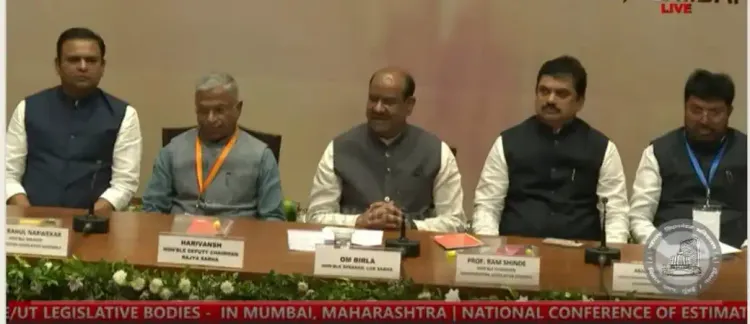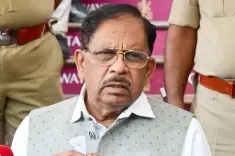How Will Central and State Estimates Panels Enhance Collaboration with AI?

Synopsis
Key Takeaways
- Collaboration: Consensus on sharing best practices among committees.
- AI Integration: Utilization of AI to enhance transparency and accountability.
- Stakeholder Engagement: Importance of involving experts in discussions.
- Digitization: Movement towards paperless parliamentary proceedings.
- Historical Contributions: Significant impact of Estimates Committee on budget reforms.
Mumbai, June 24 (NationPress) Lok Sabha Speaker Om Birla stated on Tuesday that the national conference of Estimates Committees from Parliament, State Legislatures, and Union Territories, convened here, has reached a consensus on collaborating by exchanging best practices and engaging stakeholders and experts prior to the preparation and submission of reports to Parliament and Legislatures.
He informed reporters that it was also collectively agreed upon to incorporate Artificial Intelligence and data analytics in the operations of parliamentary and legislative committees. This initiative aims to enhance transparency and accountability in governance and ensure a prudent allocation of government resources, ultimately benefiting the general public.
The Lok Sabha Speaker noted that the two-day national conference saw participation from 109 members, including the chairpersons of Estimates Committees from various states and Union Territories, along with 22 MPs, among whom was Sanjay Jaiswal, the Lok Sabha Estimates Committee chairman.
“The attendees strongly advocated for the involvement of stakeholders, particularly experts, during discussions and report preparations. It was also agreed that the general public should be informed about the status of their various representations to the committees,” he added.
He pointed out the emerging governance challenges such as rising public expenditure, the increasing intricacy of schemes, and swift technological advancements. He emphasized that the Estimates Committee has historically made significant contributions to budgetary reforms designed to improve transparency and align spending with the nation’s development objectives.
In this context, the Lok Sabha Speaker underscored that the Committee has made groundbreaking contributions in numerous areas, including the reorganization of the Secretariat, enhancement of operational capacity in railways, revitalization of public sector undertakings, and the rejuvenation of the Ganga River, among others. He mentioned that governments have accepted 90 to 95 percent of the Committee's recommendations.
When asked about the appropriateness of sharing the discussions held in parliamentary committees with the media, the Lok Sabha Speaker remarked, “The discussions should remain confidential within the committees.”
He also noted that over the past year, the Lok Sabha has implemented a series of decisions aimed at digitizing and making proceedings paperless.
“With the integration of AI, translation in 22 official languages of Parliament will now be accessible. The E-Parliament has been launched. All debates since 1854 have been digitized onto a single platform, allowing everyone to access them. Both members and citizens can view debates on Digital Sansad and in the Video Library. The Parliament library has also undergone digitization,” he stated.






